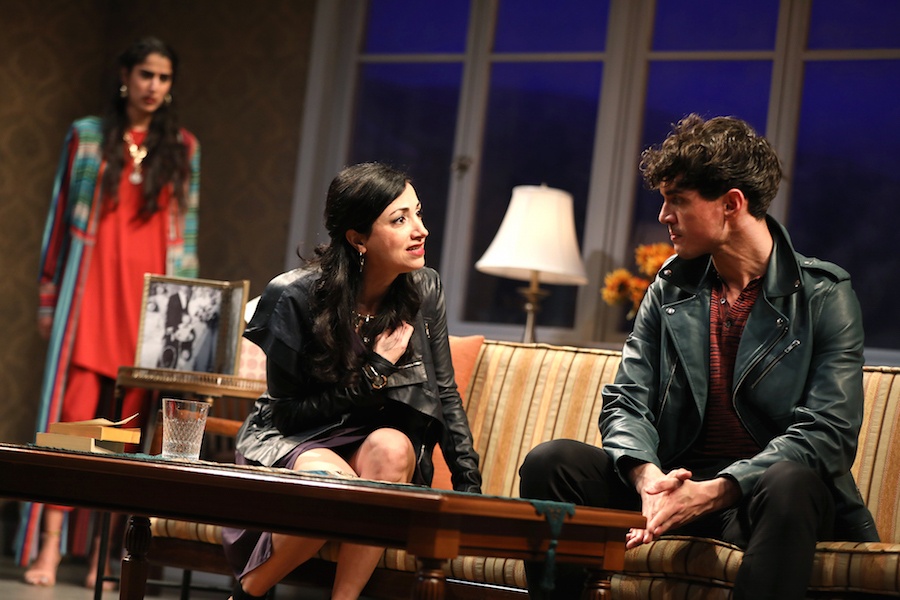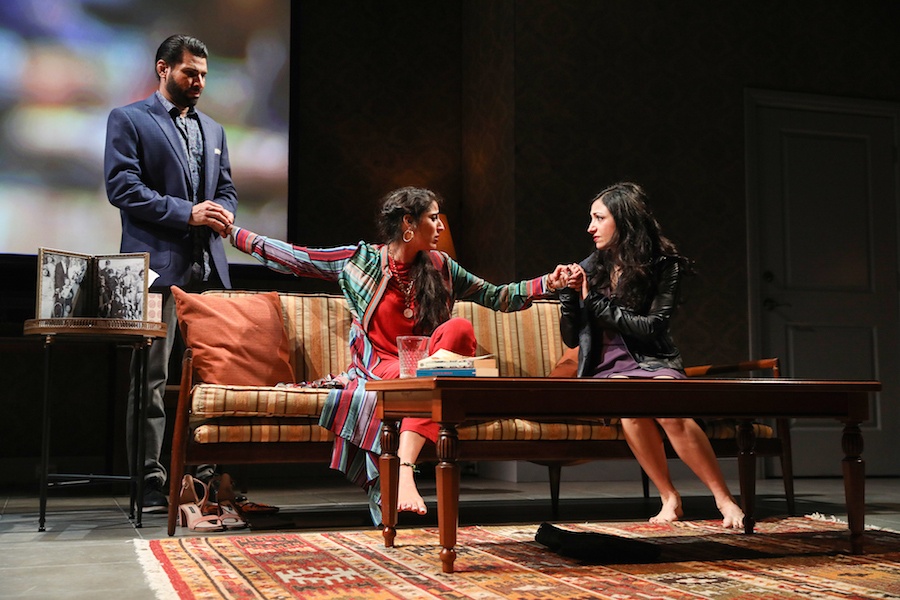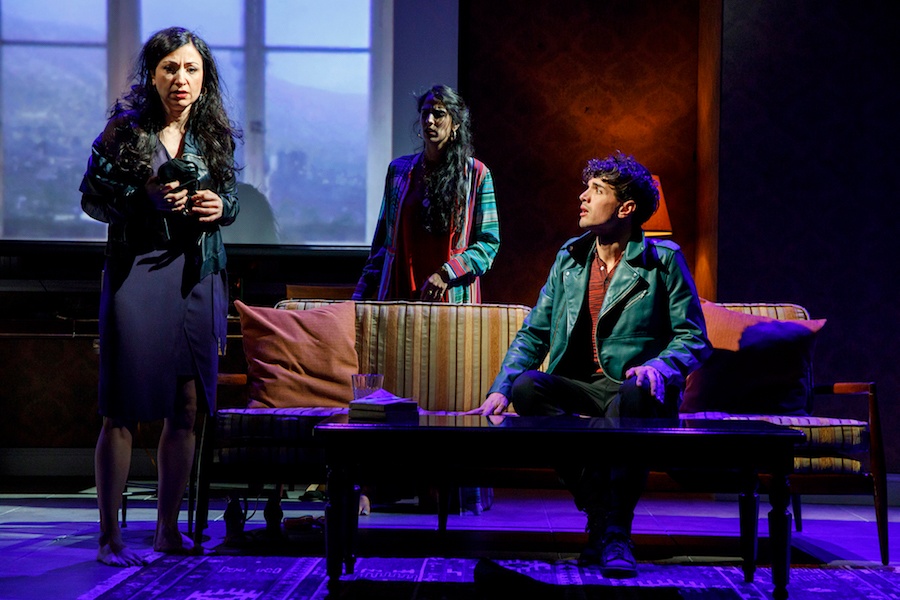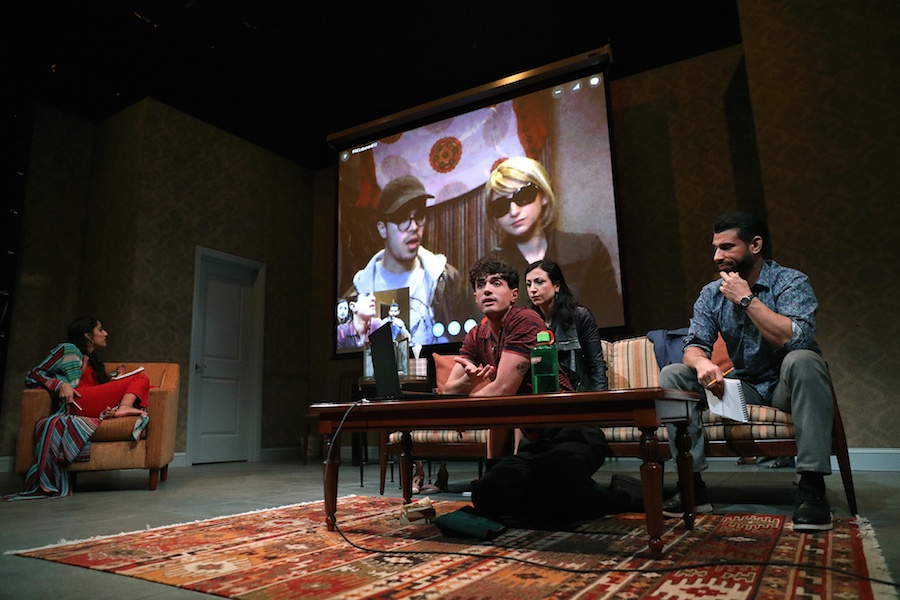
Sohina Sidhu (background), Hend Ayoub, and James Cusati-Moyer in Kiss by Guillermo Calderón, directed by Evan Yionoulis. Photo by Joan Marcus, 2018.
Has appropriation ever looked this good? Or has contemporary theater been selling itself short, without considering the boundaries of cultural literacy, and the universes that lie within it?
Those are the questions at the heart of Kiss, a new work from Chilean playwright Guillermo Calderón and director Evan Yionoulis at the Yale Repertory Theatre through May 19. A story of love, civil war, and epic cultural misunderstanding, the play opened to the public last week. It comes to the Rep as a project of the Binger Center for New Theatre.
The play opens on Damascus in the year 2014, where friends Hadeel (Sohina Sidhu), Ahmed (Ian Lassiter), Bana (Hend Ayoub) and Youssif (James Cusati-Moyer) have a weekly date to watch a soap opera. It is, we think at first, a welcome moment of normalcy in a country rocked by civil war, where friends can still gather for tea and snacks and be themselves. A short, sweet mental escape.
But from the moment Hadeel strides onto the stage, something seems off. Youssif is too early; Bana is running late, the food hasn't been made. Everything is too big: the stage swallows designer Ao Li’s set, revealing the brick wall usually hidden by a scrim. Hadeel is glamorous and collected, dressed in bright red and with a silky blue-green robe to match. Behind her, the earthy tones of the modern furniture make us feel safer than we should in a play about the experience of Syrian citizens and refugees, and residents of a once-historic city that’s been bombed into oblivion.

Ian Lassiter, Sohina Sidhu, and Hend Ayoub in Kiss by Guillermo Calderón, directed by Evan Yionoulis. Photo by Joan Marcus, 2018.
And then Hadeel speaks, answering the door for Youssif. We’re dropped into a bona fide melodrama—a swelling, real life opera of sorts, almost beyond reality. There’s a ballooning, slapsticky love triangle, Hadeel at the helm. There’s hapless Ahmed, rushing in to make a grand gesture when nothing about the timing seems right. Bana, whose fury hangs hot in the air.
You feel at home with the four characters, dramatic as they may be. Their story is familiar: complicated love triangles, sudden confessions, laugh lines that the audience doesn’t see coming. For a moment this drama is so laughable that you forget what story you’re here to see.
But from the audience, we’re also confused. Where’s the big message about human compassion, or justice for Syrians?
The answer is in the details, which are revealed in bite-sized, bitter and surprising twists as Kiss’ universe unfolds. If there are moments that seem misplaced—a cough, a strange confession, words that flow with a certain rashness—the audience shouldn’t let them pass so easily. Everything has meaning in this world. Everything an emergency, and each moment is heavy with larger-than-life emotions and wide-eyed revelations. Not just in the sense that it should be processed through the great thespian monocle, but in the way that nothing else is.

Hend Ayoub, Sohina Sidhu, and James Cusati-Moyer in Kiss by Guillermo Calderón, directed by Evan Yionoulis. Photo by Joan Marcus, 2018.
The actors are very much along for the ride. As Hadeel, Sidhu (also the daughter in this winter’s political Death of Yadzgerd) is mesmerizing, first as a headstrong, ravenous beauty and then as something else entirely, slipping in and out of personalities in a way is alarming as it’s supposed to be. Lassiter is goofy but incredibly deep, with an unending compassion. Ayoub and Cusati-Moyer may smolder, but they are also kind and careful, working not to wound each other in the face of facts that reveak themselves.
In this world, they’re more natural than the furniture and yellow wallpaper in Li’s too-tidy set, which seems so fragile it may tear away from the play at some point. Or, conspicuously, than actress Rasha Zamamiri, who upends the play’s whole premise from her soft-spoken place offstage when we're least expecting it.
This play is truth metamorphosed into art, unrelenting in its invitation for us to wake up to the realities of the world beyond our own. It has a biological through line: Calderón was born in Santiago, Chile in 1971 on the horizon of of Augusto Pinochet’s 17-year dictatorship. His reality was a government that kidnapped, assassinated, and impoverished its people in the name of singular power.
The artist’s genesis in fascist Chile translates to the violent displacement and torment of thousands of human beings in Syria. Developed in Düsseldorf—a city that is home to thousands of Syrian refugees—Kiss asks us to examine the sanctity of Syrian stories, and the care that narrators must take in telling and retelling them.

The cast of Kiss by Guillermo Calderón, directed by Evan Yionoulis. Photo by Joan Marcus, 2018.
Perhaps the most intriguing thing about these actors is their treatment of the play’s language. As t.v. night unravels before our eyes, the playwright uses stage direction to highlight the erasure that occurs in appropriation. For this band of Yale MFA students turned Syrian citizens, each statement carries immense weight, actors’ own privilege revealed in their interpretation of the words they have to work with.
This is not just a play about the theft of one’s work and culture. It’s also a meditation on how commandeering another’s experience without living that experience often robs the work of its substance. How can you understand a language you cannot recognize? A seeming tic that doesn’t translate? Sound design that is excised, because it doesn’t fit the narrative as you read it?
It’s this attention to detail that allows us to finally confront our own privilege and unpack what it means to truly empathize with an experience half a world away. When second-year MFA candidate Abubakr Ali and Zamamiri finally take the stage, the audience exchanges their laughter for worry, their entertainment for discomfort. It’s trickery that could only happen within the walls of a theater, a hallowing awakening to the reality beyond our own.
The second show this season to take on violence, war, and terror (Father Comes Home from the Wars was the first), the piece is an ode to the bravery of Syrian actors, some of the first to act in protest of Bashar al-Assad’s government and the first to be cast out of their home. It’s a call to us to be more aware of the realities of beings beyond ourselves.
Now the question is, what will we do with what we know?